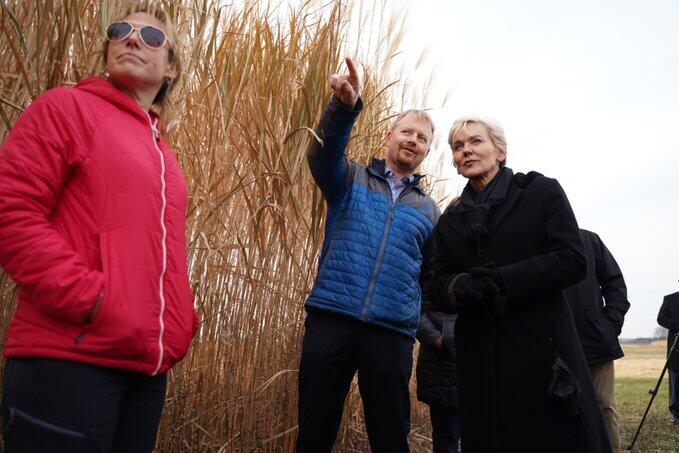DOE renews bioenergy center at Illinois

URBANA, Ill. -- The U.S. Department of Energy (DOE) has committed another round of funding to the University of Illinois Urbana-Champaign to lead the second phase of its Bioenergy Research Center — one of four large-scale DOE-funded research centers focused on innovation in biofuels, bioproducts, and a clean energy future for the country.
Earlier today the DOE announced a five-year extension of funding for the Center for Advanced Bioenergy and Bioproducts Innovation (CABBI), to a total of $237.9 million for the period from 2017 to 2027. CABBI is a collaboration between the university’s Institute for Sustainability, Energy, and Environment (iSEE); the Carl R. Woese Institute for Genomic Biology (IGB); 11 academic departments across the Illinois campus, including five in the College of Agricultural, Consumer and Environmental Sciences (ACES); and 20 partner institutions across the nation.
“To meet our future energy needs, we will need versatile renewables like bioenergy as a low-carbon fuel for some parts of our transportation sector,” U.S. Secretary of Energy Jennifer M. Granholm said in the DOE news release. “Continuing to fund the important scientific work conducted at our Bioenergy Research Centers is critical to ensuring these sustainable resources can be an efficient and affordable part of our clean energy future.”
Andrew Leakey, Professor and Head of the Department of Plant Biology at Illinois, will continue as Director of CABBI, a position he has held since 2020.
“Energy independence has become an increasingly important security issue for the United States, and CABBI will continue to provide breakthroughs toward a new generation of sustainable, cost-effective biofuels and bioproducts that will replace fossil fuel-based products,” Leakey said. “This grant represents a massive investment in CABBI and its diverse team of scientists. We are committed to help push the U.S. toward a new bio-based economy.”
Under the renewed funding, Emily Heaton, professor of Regenerative Agriculture in the Department of Crop Sciences at ACES and Illinois Extension specialist, will continue to lead the Feedstock Production theme at CABBI. Her team, which includes seven other ACES faculty from Crop Sciences, uses the “plants as factories” paradigm, in which biofuels, bioproducts, and foundation molecules for conversion are grown directly in crops that are resilient and productive.
“This award advances our capacity to protect and enhance the natural resource base on which all life depends by using resilient plants for power, fuel, and products,” Heaton said. “The science and practices being developed by CABBI and our collaborators will translate into secure domestic energy with climate benefits. I am excited we can also use this funding to complement our corn/soy agriculture with strategically placed perennial bioenergy crops, bringing cleaner air and water, healthier soil, and good new jobs for our rural communities.”
The two other CABBI themes, Conversion and Sustainability, are also stacked with lead scientists from ACES departments. Those teams focus on turning plants into high-value chemicals and ensuring a sustainable environmental and economic bottom line, respectively.
Madhu Khanna, Alvin H. Baum Family Fund Chair, Director of iSEE, a CABBI Sustainability Theme researcher, and Professor in the ACES Department of Agricultural and Consumer Economics, said iSEE is excited to support CABBI research in partnership with IGB and with the College ACES to enable cutting-edge research at the 320-acre Illinois Energy Farm — “a unique living laboratory that enables researchers to grow trials of promising biofuel feedstocks at the field scale” — and other partner sites.
“One of the world’s major challenges is to provide sustainable sources of energy that meet societal needs as the population continues to grow,” Khanna said, “and Illinois is uniquely qualified to help lead that challenge” with the world-class facilities at IBRL and at IGB — the latter of which oversees and integrates CABBI’s core science team under one roof.